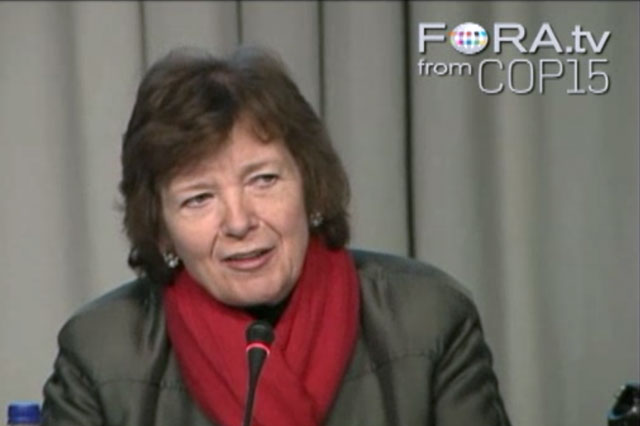The Impacts of Climate Change and Potential for Cop 15
On December 15th 2009 at the United Nations Climate Change Conference in Copenhagen, Mary Robinson and other leaders from the public, academic and NGO sectors led a discussion on emerging institutions and processes for applying equity and human rights to guide the long term vision and decision-making on mitigation, adaptation, REDD, carbon markets and technology transfer.
This event was convened by Erasmus University Rotterdam, University of California/Berkeley, Realizing Rights: The Ethical Globalization Initiative, Dartmouth College, the Smith School of Oxford University, and the Transnational Institute.
Speakers:
- Michael K. Dorsey is an assistant professor at Dartmouth College. He works on issues of international equity, politics of biodiversity and environmental justice with a focus on Amazonia.
- Laurel Fletcher is Clinical Professor of Law and Director of the International Human Rights Law Clinic at UC Berkeley School of law. Before joining the Berkeley Law faculty in 1998, she practiced complex civil litigation, including representing plaintiffs in employment discrimination class actions.
Fletcher is active in the areas of transitional justice and humanitarian law, as well as globalization and migration. As director of the International Human Rights Law Clinic, she utilizes an interdisciplinary, problem-based approach to human rights research, advocacy, and policy. She has conducted empirical studies of the human rights impacts of Hurricane Katrina and the 2004 tsunami, forced labor in the United States, forced migration from the Dominican Republic, and the relationship between justice, accountability, and reconciliation in Bosnia.
She also has advocated for human rights victims before international human rights and criminal tribunals.
- Tamra Gilbertson is one of the founders of Carbon Trade Watch, a project of the Transnational Institute (TNI), and co-author of Carbon Trading: How it works and why it fails. She has been active in the project since 2001 and was a founding member of the Durban Group for Climate Justice. She is trained in photography and film-making and was a co-director of The Carbon Connection.
She received a Teamsters Union Scholarship from 1995 to 1998 and the Samuel Rubin Young Fellowship Award in 2004.
- Larry Lohmann, author and founding member of the Durban Group for Climate Justice, is sharing experiences in the U.S. concerning the failure of carbon trading in Europe, India, Brazil, Uganda, and elsewhere, and is learning more about U.S. carbon trading plans and climate politics.
In 2004, the Durban Group convened in Durban, South Africa, to question the central role of carbon trading in official responses to the climate crisis. Since 1997, Lohmann has worked with the Corner House, a research and solidarity organization based in the UK (http://www.thecornerhouse.org.uk).
During the 1980s, he lived and worked in Thailand, teaching and working with local environmental groups. Over 350,000 copies of his latest book, Carbon Trading: A Critical Conversation on Climate Change, Privatization and Power (2006) have been downloaded from the Internet. He is co-author of Pulping the South: Industrial Tree Plantations and the Global Paper Economy (1996) and Whose Common Future? Reclaiming the Commons (1993) and co-editor of The Struggle for Land and the Fate of the Forests (1993).
His articles on globalization, racism, environmental conflict in Southeast Asia, and the discourses of population and neoclassical economics have appeared in journals such as Science as Culture, New Scientist, Asian Survey, International Journal of Pollution and Environment, Development Dialogue, Red Pepper, and Watershed, as well as in numerous scholarly books. Lohmann has received degrees from Cornell and Princeton and has been a visiting fellow at Yale University.
- Cymie Payne, an expert in natural resource and environmental law, joined the Boalt Hall faculty in 2006 after working for international and domestic entities engaged in environmental regulation and advocacy. Following graduation from Boalt with an environmental certificate, Payne served as an attorney-advisor in the Solicitor’s Honors Program at the U.S. Department of the Interior, where she advised a host of governmental agencies on land claims, endangered species protection, tribal rights and other issues. She also worked in the environmental department of Goodwin Procter’s offices in Boston. Before law school, Payne served as the executive director of Earth Access, a nonprofit forest conservation organization that she founded in Cambridge, Mass.
Payne was employed from 1999 to 2005 by the United Nations Compensation Commission. As a senior attorney, she was responsible for an international team of lawyers and technical experts assessing claims of damage to the environment and public health from conflict in the Persian Gulf. In this position, she supported a panel of commissioners involved in landmark decisions that granted war reparations for environmental damage.
In addition to teaching at Boalt, Payne serves as the associate director of the Center for Law, Energy, and the Environment (CLEE) and as director of the Global Commons Project, which seeks to extend the influence of environmental law on global policy.
- Gail Whiteman is an Associate Professor in the Department of Business-Society Management at Rotterdam School of Management, Erasmus University, and also teaches in the MBA program.
She was born in Canada and worked at a variety of different private and public organisations, primarily in the marketing field. From 1997 till 2001 she was a senior researcher in the field of corporate responsibility at the North-South Institute in Canada.
Gail Whiteman has a PhD in Management from Queen’s University in Canada, with a major in organisational behaviour and marketing. Her research interests include: organisational behaviour, business & society, corporate social responsibility, business & environment, marketing and international advertising.


